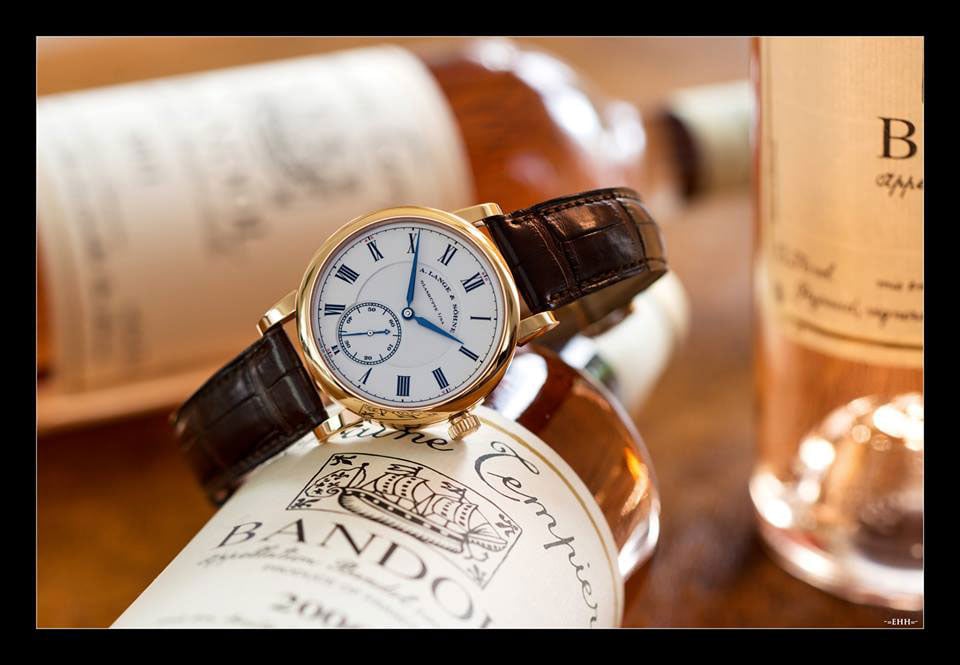Weekly Watch Photo – A. Lange & Söhne Richard Lange Pour le Mérite

Here at Monochrome we always start the week with our Weekly Watch Photo. This week we’ll show you some magnificent photos of the A. Lange & Söhne Richard Lange Pour le Mérite. The photos are made by Edwin, who moderates the A. Lange & Söhne forum at Timezone.com. The Richard Lange Pour le Mérite (PLM) was introduced in 2009, as a limited edition of 200 pieces, and incorporates the fusée-and-chain constant force mechanism.
Later more about the fusée-and-chain mechanism, we’ll first focus on the classic dial that is immediately recognizable as a Lange & Söhne. The enamel dial consists of three separate parts: the main dial for hours and minutes, a recessed central segment with the Lange signature, and the subsidiary seconds dial at 6 o’clock. Around the perimeter are large Roman numerals for the hours and a rail track for the minutes. At 15, 30, 45 and 60 these numbers are printed in red around the minute marker.

The Richard Lange PLM measures a robust 40.5 mm in diameter and 10.7 mm in height. Robust for Lange that is, as most of their classic three-hand timepieces are smaller in size. The very reason for the slightly larger dimensions, lays beneath the crisp white enamel dial, and is called caliber L044.1 that comprises no less than 915 individual components. Usually movement with 300+ component feature at least a tourbillon, a minute repeater or another complication. In this case the impressive number of individual parts is due to the fusee-and-chain and actually the chain in particular.
The chain is composed of 636 parts, which together make 212 links. The chain measures a length of 152 millimeters and is a pinnacle in fine watchmaking. All links in the chain must have absolute freedom of movement so that the chain can be precisely wound and unwound.
Constant force and the fusee-and-chain
The goal of this fusee-and-chain mechanism is to get a constant flow of force to the escapement; it is a constant force mechanism. When the main spring is fully wound, it contains a lot of force that is seeking to unwind through the gear train. The speed in which it is allow to unwind, is determined by the escapement and you can imagine that the force upon the escapement is much more when the main spring is fully wound, than when it is almost fully unwound.
This variation in force on the escapement causes fluctuation in the precision of the watch and that is what watchmakers want to reduce as much as possible. Hence the popularity of timepieces with a constant force mechanism. The fusee-and-chain mechanism is a classic constant force mechanism that works more or less like a variable transmission. On the A. Lange & Söhne website (click here) you can read a comprehensive explanation of the fusee-and-chain mechanism.

The rest of the movement comprises 279 parts of which 33 jewels, and measures 31.6 mm in diameter and 6.0 mm in height. The Richard Lange PLM has an autonomy of at least 36 hours when fully wound. Caliber L044.1 features 2 screwed gold chatons, a lever ecsapment, and a shock-resistant glucydur screw balance with poising screws. A. Lange & Söhne is one of the few manufactures who make their own hair spring (also called balance spring) in-house and this Richard Lange PLM also features an in-house made balance spring. It vibrates with a frequency of 21,600 semi-oscillations per hour.
Some more of Edwin’s photos of his Richard Lange Pour le Mérite in 18 carat pink gold. The Richard Lange PLM is a limited edition of 200 pieces.













2 responses
I’m a fan of the classy enamel dial and the food themed photoshoot! I’m assuming it has a clear caseback, would love to check the movement out, please update us if you get any shots of it.
These were all photos of the Richard Lange PLM, but soon more similar photos. Glad you like ’em, Simon.